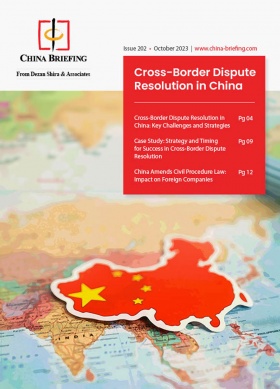China’s “24 Measures” to Attract Foreign Investment: Progress Report
Six months after the implementation of new measures aimed at attracting foreign direct investment in China and optimizing the business environment, official updates on the progress of these measures have been released. Successes have been reported such as productive roundtable discussions with FIEs, extensions of tax breaks for foreign employees and domestic R&D equipment purchases, and enhancements in foreign executive travel procedures. However, work is still ongoing in other key areas.
In July 2023, the State Council issued the “Opinions of the State Council on Further Optimizing the Foreign Investment Environment and Intensifying Efforts to Attract Foreign Investment”, also referred to as the “24 measures”, to boost foreign direct investments in China.
This document includes 24 measures sub-divided into 59 specific items, ranging from improving intellectual property rights to facilitating cross-border data flows.
Six months into the implementation of these measures, the Minister of Commerce Wang Wentao, during a press conference, provided official updates on the initial progress of China’s 24 measures. However, he refrained from delving into specific achievements, opting instead to provide a broad overview of the advancements made thus far.
While expressing satisfaction with the progress achieved, Wang Wentao disclosed that 60 percent of the policy measures have been successfully implemented or have made steady progress. Specifically, he mentioned that 10 out of 59 policies were completed, 28 have made phased progress, and 21 are continuing to advance.
Completed measures for foreign investment facilitation
Regarding the completed measures, Zhu Bing, Deputy Director of the Department of Foreign Investment Administration, offered some more insight by mentioning some of the measures that have been successfully tackled.
Institution of roundtable discussions with foreign businesses
Roundtable discussions, introduced in July 2023 as part of the Ministry of Commerce’s (MOFCOM) foreign trade and foreign investment coordination mechanism, aim at fostering regular and more direct communication with foreign-funded enterprises (FIEs), thereby facilitating the resolution of operational issues.
Since their inception, these roundtable meetings have witnessed substantial participation, with over 400 FIEs and foreign chambers of commerce engaging in 16 roundtable meetings by the end of January 2024. These discussions have successfully addressed more than 300 individual issues.
At a provincial level, this initiative recorded even more impressive numbers, with over 140 roundtable meetings held, involving more than 2200 FIEs and resulting in the resolution of over 900 issues.
Finally, the launching of an online reporting platform contributed to the expansion of communication channels available to FIEs, allowing for direct expression of concerns and prompt responses from relevant authorities. This approach significantly bolstered confidence among foreign investors, while also contributing to fostering a conducive business environment within China.
Extension of tax breaks for foreign employees and domestic R&D equipment purchases
Among the array of measures that have been enacted, the Ministry of Finance (MOF) and State Taxation Administration (STA) have extended the implementation period of two key policies: the tax exemption policy for foreign individual subsidies and the tax refund policy for the purchase of domestic equipment by foreign-funded R&D institutions, now effective until the end of December 2027.
On one hand, the first one is beneficial for all foreign individuals working in China as well as companies trying to retain foreign talents, as it includes tax-exempt items such as house rental, children’s education costs, and language training costs, ensuring ongoing substantial tax savings for foreign employees.
On the other hand, the second one underscores the Chinese government’s sustained support for innovation in the R&D sector. By providing tax incentives, this policy has the potential to significantly reduce the financial strain on the R&D institutions, rendering it increasingly attractive to foreign investors.
Improving foreign executive travel
Finally, on December 1, 2023, the National Immigration Administration of China (NIA) launched a new upgraded version of the permanent residence ID card for foreigners.
This enhanced version of the card features an extended 18-digit card number, ensuring each individual with an exclusive and lifelong identifier. Furthermore, the card incorporates optimized anti-counterfeiting technology to better safeguard personal information, alongside improved methods for information storage and management.
Beyond its enhanced features, the new ID card offers multifaceted utilities as it can be used for managing private matters online, including travel, daily consumptions, and financial services. It also allows the holders to enter and exit China multiple times without the need for visa applications.
The launching of this new ID card, along with the updated “Guidelines for Foreign Businessmen to Live and Work in China,” suggests the concrete effort placed to improve the convenience and quality of life of foreigners residing in China. According to Wang Wentao’s declarations, the new ID card will ultimately enhance the ease of transportation, daily life, and consumption within the country.
Measure to be implemented
Improving cross-border data transfer procedures
Among the 28 measures demonstrating phased progress, some are aimed at addressing longstanding concerns for FIEs.
Zhu Bing placed special attention on the Cybersecurity Administration of China (CAC) formulation of “Provision on Regulating and Facilitating Cross-Border Data Flow” which is currently being studied, improved, and prepared for promulgation.
This document aims at streamlining procedures for cross-border personal information transfer (PI), underpinning Chinese authorities’ efforts to simplify the regulatory framework surrounding cross-border data transfer (CBDT). The need for such a simplification has resulted from the challenges FIEs face in navigating China’s CBDT requirements, as highlighted in recent surveys by foreign chambers of commerce in China, see American Chamber of Commerce in China’s (AmCham) latest survey and the German Chamber of Commerce in China’s Business Confidence Survey.
These concerns are longstanding, prompting China to undertake substantial efforts to bolster its cybersecurity and data protection framework in recent years, through the issuing of updated guidelines and regulations. In 2023, noteworthy advancements were made, particularly in refining regulations governing the export of PI, while also spending time reconsidering the stringent CBDT requirements. Noteworthy in this regard has been China’s cybersecurity authorities’ recent proposal on easing CBDT requirements to alleviate uncertainties and compliance burdens for many companies, while still prioritizing data security.
Within this proposal, Free Trade Zones (FTZs) like the Lingang New Area of the Shanghai FTZ and the Greater Bay Area, have been at the forefront of piloting policies aimed at facilitating CBDT. By spearheading these initiatives, these FTZs are contributing to China’s broader efforts to create a more conducive environment for foreign investment and business operations.
Strengthening intellectual property rights
Despite progress in the realm of CBDT, there are still 21 measures that are undergoing continuous promotion and that demand further attention.
Notably, among these, efforts to safeguard intellectual property rights remain crucial, requiring sustained attention on behalf of responsible authorities. The State Intellectual Property Office is actively guiding and supporting relevant localities in establishing intellectual property service stations during exhibitions across regions. These stations will facilitate patent priority examination acceptance, intellectual property maintenance, comprehensive consultation, and other essential services aimed at supporting intellectual property rights during exhibitions.
How effective has China’s implementation of the 24 measures been in improving the business environment?
The measures implemented thus far have garnered success and approval among FIEs, thereby underscoring their effectiveness in improving China’s business environment. Surveys conducted by MOFCOM reveal that over 80 percent of the companies expressed satisfaction with the progress made, with 90 percent of respondents finding the Chinese market highly attractive, and almost 70 percent expressing optimism regarding market prospects in the next five years.
Surveys of American and European companies operating in China also reflect this positive sentiment, suggesting improving investment confidence in the sector. Specifically, in the latest AmCham survey, half of participating US companies ranked China as one of their top three global investment priorities. Similarly, most German companies, as per the German Chamber of Commerce in China’s Business Confidence Survey published in January, had no immediate plans to leave within the next two years, with more than half planning to increase their investments in the country.
Furthermore, the observed improvement in foreign investment inflows in China in the fourth quarter of 2023 adds weight to this positive trend. Despite an overall decrease of 8 percent in inflows compared to 2022, as reported by Caixin, China registered a rebound in net foreign direct investment in the fourth quarter of 2023 compared to the three months prior. In this regard, Wang Wentao’s mention of a 39.7 percent increase in the number of newly established FIEs in China illustrates foreign investors’ growing enthusiasm for opportunities in the Chinese market.
However, while the overall picture appears positive, a closer look at the surveys conducted by foreign chambers of commerce reveals persistent concerns that still need to be addressed to fully restore foreign investors’ confidence. Such issues include unequal treatment during public procurement and the eligibility of foreign products in government procurement, along with continuing uncertainties in the CBDT sector. It is expected that both the central government and local authorities will intensify their efforts to address these issues in the coming year.
During the press conference, Wang Wentao highlighted how FIEs have provided valuable feedback on the further implementation of the 24 measures. These suggestions will guide authorities in continuing to promote and accelerate the implementation of the measures to strengthen China’s appeal to foreign investors.
About Us
China Briefing is written and produced by Dezan Shira & Associates. The practice assists foreign investors into China and has done so since 1992 through offices in Beijing, Tianjin, Dalian, Qingdao, Shanghai, Hangzhou, Ningbo, Suzhou, Guangzhou, Dongguan, Zhongshan, Shenzhen, and Hong Kong. Please contact the firm for assistance in China at china@dezshira.com.
Dezan Shira & Associates also has offices in Vietnam, Indonesia, Singapore, United States, Australia, Germany, Italy, India, and Dubai (UAE). We also have partner firms assisting foreign investors in The Philippines, Malaysia, Thailand, Bangladesh.
- Previous Article Hong Kong Budget 2024-2025 – Government Implements New Tax Arrangements and Extends Funding Schemes
- Next Article China Sets 2024 GDP Growth Target at “Around 5%”: Key Highlights from the Two Sessions








